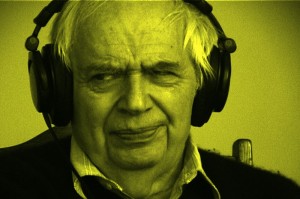You have no items in your cart. Want to get some nice things?
Go shoppingWhen my grandfather asked me what I got up to at the Latitude festival this past weekend, I gave him an edited version. I cut out the parts where I danced until 3 a.m. at a rave in the woods, broke my tent in a drunken haze, and jumped like a loon to the sounds of Kele Okereke and The National. Instead, I chose to tell him about the various other cultural events I had attended. Something I thought he might like to hear about was my time spent at the excellent poetry tent at the festival. He listened with silent approval as I told about seeing John Burnside and Simon Armitage, but when I told I had attended a poetry slam, his disdain was obvious. According to my grandfather, slam poetry is not “true poetry”.

I was taken aback by his response, but when I started to investigate further into the world of poetry slams, I discovered that they aren’t universally loved. Indeed, the critic Harold Bloom branded them “the death of art” in the Spring 2000 issue of the Paris Review, deploring the way in which young poets are “declaiming rant and nonsense at each other”. George Bowering, the former poet laureate of Canada, condemned poetry slams as “abominations” that are “crude and extremely revolting”, whilst Jonathan Galassi, the honorary chairman of the Academy of American Poets, derisively terms them as “a kind of karaoke of the written word”.
For those who are unfamiliar with what poetry slam is, it can be best described as a competitive event in which poets perform and compete against each other in front of a live audience and a panel of judges. Performance is just as important as the poetry and the poet is awarded points for both. There’s also usually a time limit, adding another competitive element.
Poetry slams are raucous events. They are more likely to take place in a bar than a bookstore, and there’s lots of shouting and the audience show their appreciation by booing, whooping and clapping before, during, and after the performances. Sometimes the winner is chosen by an audience “clap-o-meter”. It’s probably this sort of behaviour that dismays critics such as Bloom and Bowering, and led Jonathan Galassi to draw similarities between poetry slams and karaoke contests. Moreover the competitive element of poetry slams repels some people. They think art takes time; it’s meant to be appreciated and absorbed slowly. Instead, poetry slams mangle literature into a low-quality, quick-fire oneupmanship, diluting true art for the masses.
I, however, see the positives. Firstly, poetry slams were introduced at a time when interest in poetry was waning. In 1986, the first regular slam was held at the Green Mill Jazz Club in Chicago, which quickly rejuvenated flagging local interest in the art form. Today, slams are a great way to involve people who would normally avoid poetry at all costs; it gets them to start reading, to enjoy fresh, original work. Poetry can have a reputation nowadays for being “exclusive” and “outdated” but slams are working to regain some of that lost street-cred. Poetry sams are seen as cool, and as such, poetry too. The diversity in participants also proves that poetry slams attract people of all types: from freestyle rappers to indie hipsters, nerdy college boys to prim girls in tweed; all kinds of people have taken part and triumphed in slams across the country.
I challenge anyone not to enjoy themselves at a slam. I have always loved listening to poets read their work aloud and, rather than detracting from the distinctiveness of the spoken word, the competitive element actually makes it fun. Yes, poetry written for slams tends to differ from the traditional works learnt at school and college but it is written, not with competition in mind, but with the main purpose of being read aloud. The motto of poetry slams, coined in 1994 by Allan Wolf, maintains that “the points are not the point; the point is poetry”, reminding poets, organizers, and audiences that the purpose is to spread and share wonderful, exciting poetry to a new audience.
So when you next get the chance, attend a poetry slam and see what all the fuss is about. Take a friend, have a few drinks, holler for your favourites and heckle their rivals. By the end of the night, you’ll have heard some great poetry, had a good time and, hopefully, rekindled or reaffirmed your love of the spoken word.





Slam Poetry would do well to distance itself from traditional poetry as much as possible, I think, that way it wouldn’t attract so many sneers from the more literary poetry fans.
Perhaps the best way to do this would be to drop the ‘poetry’ tag altogether. I mean, since when has ‘poetry’ been the preserve of people that are confident enough to stand up in front of a pub/bar full of drunk people and share something truly authentic and personal?
I mean, I kind of like Slam Poetry and I’ve enjoyed myself at a few of these nights, but to me it often seems like really poor poetry performed by very confident, charismatic people.
Perhaps it needs to be reclassified, to become a new means of expression in its own right before it can be measured according to its own virtues and not its perceived inadequacies when compared to the considerable legacy of traditional poetry.